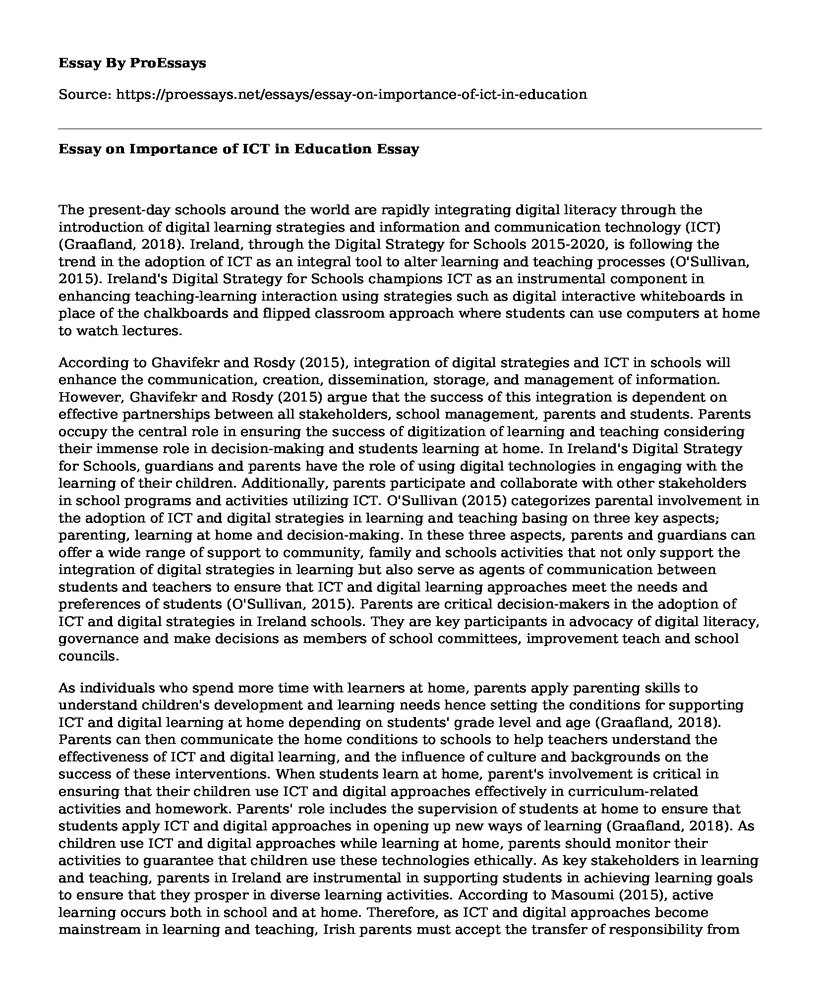The present-day schools around the world are rapidly integrating digital literacy through the introduction of digital learning strategies and information and communication technology (ICT) (Graafland, 2018). Ireland, through the Digital Strategy for Schools 2015-2020, is following the trend in the adoption of ICT as an integral tool to alter learning and teaching processes (O'Sullivan, 2015). Ireland's Digital Strategy for Schools champions ICT as an instrumental component in enhancing teaching-learning interaction using strategies such as digital interactive whiteboards in place of the chalkboards and flipped classroom approach where students can use computers at home to watch lectures.
According to Ghavifekr and Rosdy (2015), integration of digital strategies and ICT in schools will enhance the communication, creation, dissemination, storage, and management of information. However, Ghavifekr and Rosdy (2015) argue that the success of this integration is dependent on effective partnerships between all stakeholders, school management, parents and students. Parents occupy the central role in ensuring the success of digitization of learning and teaching considering their immense role in decision-making and students learning at home. In Ireland's Digital Strategy for Schools, guardians and parents have the role of using digital technologies in engaging with the learning of their children. Additionally, parents participate and collaborate with other stakeholders in school programs and activities utilizing ICT. O'Sullivan (2015) categorizes parental involvement in the adoption of ICT and digital strategies in learning and teaching basing on three key aspects; parenting, learning at home and decision-making. In these three aspects, parents and guardians can offer a wide range of support to community, family and schools activities that not only support the integration of digital strategies in learning but also serve as agents of communication between students and teachers to ensure that ICT and digital learning approaches meet the needs and preferences of students (O'Sullivan, 2015). Parents are critical decision-makers in the adoption of ICT and digital strategies in Ireland schools. They are key participants in advocacy of digital literacy, governance and make decisions as members of school committees, improvement teach and school councils.
As individuals who spend more time with learners at home, parents apply parenting skills to understand children's development and learning needs hence setting the conditions for supporting ICT and digital learning at home depending on students' grade level and age (Graafland, 2018). Parents can then communicate the home conditions to schools to help teachers understand the effectiveness of ICT and digital learning, and the influence of culture and backgrounds on the success of these interventions. When students learn at home, parent's involvement is critical in ensuring that their children use ICT and digital approaches effectively in curriculum-related activities and homework. Parents' role includes the supervision of students at home to ensure that students apply ICT and digital approaches in opening up new ways of learning (Graafland, 2018). As children use ICT and digital approaches while learning at home, parents should monitor their activities to guarantee that children use these technologies ethically. As key stakeholders in learning and teaching, parents in Ireland are instrumental in supporting students in achieving learning goals to ensure that they prosper in diverse learning activities. According to Masoumi (2015), active learning occurs both in school and at home. Therefore, as ICT and digital approaches become mainstream in learning and teaching, Irish parents must accept the transfer of responsibility from teachers and become managers of children's learning priorities outside school.
References
Ghavifekr, S., & Rosdy, W. (2015). Teaching and learning with technology: Effectiveness of ICT integration in schools. International Journal of Research in Education and Science, 1(2), 175-191.
Graafland, J. (2018). New technologies and 21st-century children: Recent trends and outcomes. Paris: Organisation for Economic Co-operation and Development.
Masoumi, D. (2015). Preschool teachers' use of ICTs: Towards a typology of practice. Contemporary Issues in Early Childhood, 16(1), 5-17.doi: 10.1177/1463949114566753.
O'Sullivan, J. (2015). Digital Strategy for Schools 2015-2020. Dublin, Ireland: Department of Education and Skills.
Cite this page
Essay on Importance of ICT in Education. (2022, Jul 15). Retrieved from https://proessays.net/essays/essay-on-importance-of-ict-in-education
If you are the original author of this essay and no longer wish to have it published on the ProEssays website, please click below to request its removal:
- Comparison of Gender Relations in Hispanic and African American Families
- Feed the Children Organization: Delivering Life Essentials and Hope - Essay Sample
- Essay Sample on Classroom Management Plan: Essential for Better Student-Teacher Relationships
- Essay Sample on Kinesics: Unlocking the Power of Non-Verbal Communication
- Essay Sample on Effective Communication: A Key to Workplace and Production Morale
- Vertical Communication: Effects on Morale, Ethics, and Performance - Essay Sample
- Paper Example on Doctors & Patients: Meeting Challenges in Treatment through Technology







